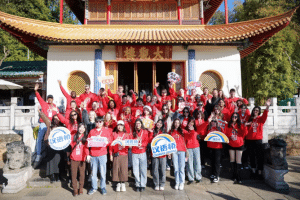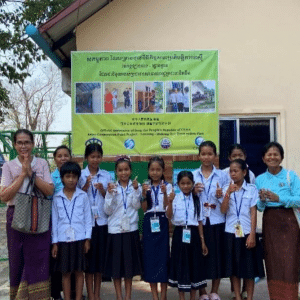Artificial intelligence (AI) has become a major topic in recent years. Following the global impact of ChatGPT in 2023, Sora was introduced in February this year, further signaling the rapid advancement of AI.
In March, the UN General Assembly adopted a landmark resolution promoting “safe, secure and trustworthy” AI systems that support sustainable development for all. This marked the first time the Assembly has passed a resolution on regulating AI. The US National Security Advisor called this adoption an “historic step forward” for the safe use of AI.
In China, international IT giants and local Chinese social organizations are also preparing for the AI era.
In April, Microsoft and Non-Profit Incubator (NPI) jointly hosted the “2024 Microsoft Nonprofit Information Day” at Microsoft China Headquarters in Beijing. This year’s theme was AI for Good.
Experts in technology, alongside practitioners from over100 nonprofit organizations, including CDB, gathered to discuss the rapid development of AI technology and the immense opportunities it presents for the digital transformation, intelligent innovation, and automated operations in the nonprofit sector.
Microsoft and NPI have also launched the “Smart Innovation Operation Manual for Nonprofit Organizations“. Based on Microsoft’s global experience in implementing AI technologies in charitable activities, the manual combines technological achievements with the practical needs and applications of Chinese society. It provides valuable references on issues such as technology application, data security, and scientific & technological ethics that charity organizations may encounter while adopting AI technologies.

Wang Ling, Philanthropies Lead of Microsoft (GCR), emphasized that the rapid development of AI technology has brought significant changes across various sectors. Many nonprofit organizations are curious about how to integrate intelligent technology into their daily work, the tools available, and potential security risks.
She highlighted that Microsoft began integrating technology and charity in China since 1997, offering software, technical support and other resources to non-profit organizations. Since 2010, Microsoft has held over 20 “Microsoft Non-profit Information Days” in multiple cities, engaging more than 1,000 organizations and promoting the exploration of technology in Chinese NGOs’ charitable work.
Wang Ling added, :” This time, Microsoft hopes that participating charity partners can discuss the prospects, opportunities and challenges of AI technology empowerment from different perspectives, including technology trends, application scenarios, data security, and science & technology ethics, to bring more positive changes to society.”
Lv Zhao, founder and director of NPI, noted that the rapid development of digital technology, especially AI, will inject transformative changes into China’s charity sector, presenting an optimistic blueprint for its advancement. “We are delighted to be part of this, working with Microsoft and other partners to bridge technology and charity.”
Microsoft has long supported the development of Chinese philanthropy and non-profit organizations. In June 2011, Microsoft launched the Tech4Good campaign globally. Over the years, this campaign has helped Microsoft donate software, hardware products, services and funds worth more than RMB 360 million to hundreds of non-profit organizations in China.
Beneficiaries include the China Foundation for Youth Entrepreneurship and Employment (YEE), the China Development Research Foundation (CDRF), Non-Profit Incubator (NPI), China Social Entrepreneur Foundation (YouChange), Beijing Hongdandan Cultural Service Center for the Visually Impaired, Shan Shui Conservation Center (SSCC), Shanghai Jiuqian Volunteer Center, and the Illness Challenge Foundation.
Faced with new innovation opportunities brought about by AI, Microsoft, based on the successful global practices and a deep understanding of China’s charity sector’s development needs, collaborated with NPI to produce the “ Smart Innovation Operation Manual for Nonprofit Organizations “.
The manual provides specific solutions and case references for integrating the latest AI technology products, services, and tools into the daily work scenarios of non-profit organizations. It also addresses data security and scientific and technological issues.
During the roundtable discussion, cross-disciplinary experts engaged in lively debates on the opportunities and challenges AI presents for the nonprofit sector.
“Trust is the foundation for non-profit organizations to survive,” said Xu Yongguang, former chairman of the Narada Foundation, “This requires higher work efficiency, safer donation management, and more transparent organizational operations. AI technologies can undoubtedly enhance our efficiency, and I look forward to the potential role of technology in ensuring safety and building trust.”
Wei Qing, Chief Technology Officer of Microsoft China, stated “As charitable organizations navigate continuous technological advancements, they need to focus on disenchantment and action. They should return to humanity and start from empirical evidence and take concrete actions to leverage technology for their benefit. Microsoft aims to support more charitable organizations in using our AI platforms and tools for business innovation and operational enhancement.”
In the afternoon, NGO representatives experienced Microsoft’s AI platform Copilot, for first time. They were amazed by the system’s capabilities in information collection, language organization and expression, and office assistance.

In conclusion
With the continuous development of science and technology, more exchanges and dialogues between the nonprofit and IT sectors are necessary. This collaboration can help more NGOs benefit from AI advancements while ensuring AI’s safe, secure and trustworthy development. In China, it is anticipated that this new technology can empower the NGO sector and foster the development of civil society.



